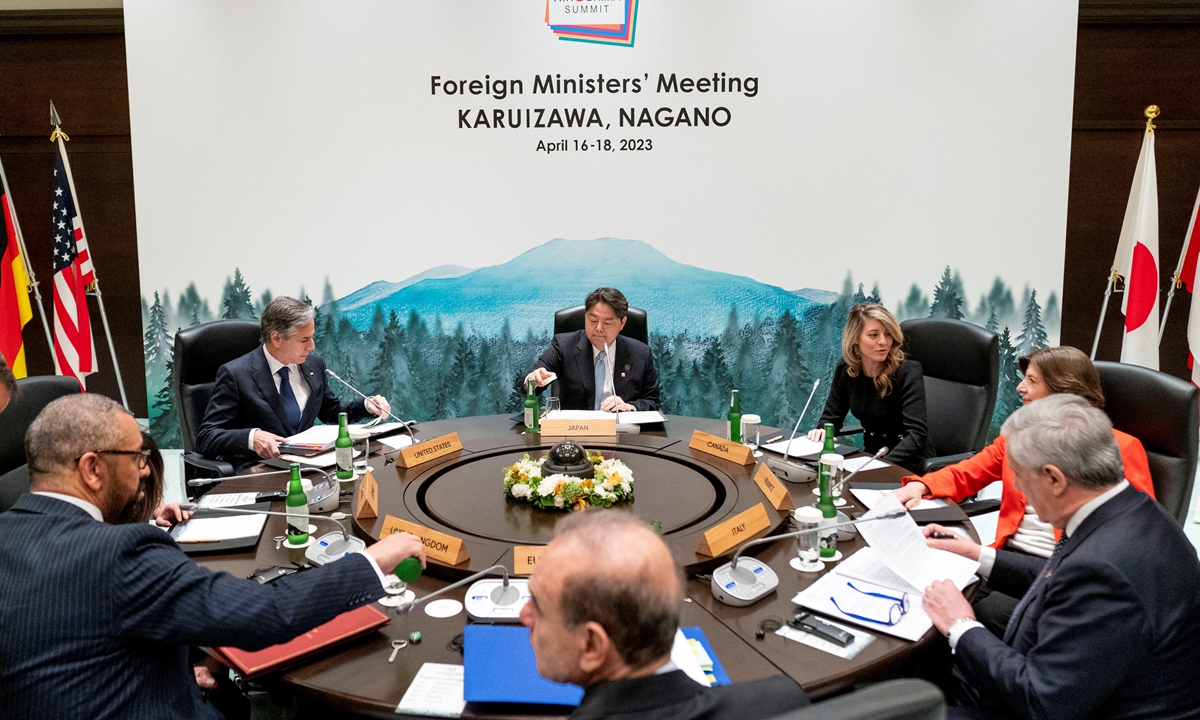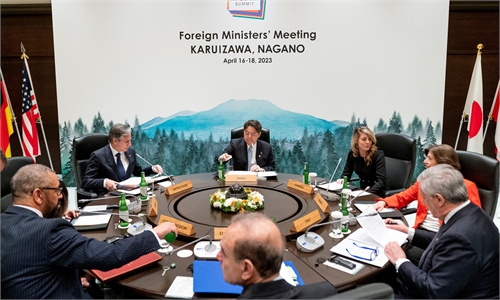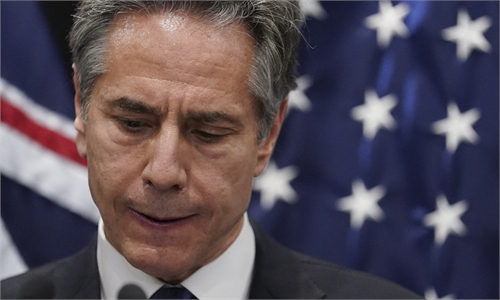China strongly opposes joint communiqué of G7 foreign ministers meeting
'Obvious divergences' inside bloc as Macron's remarks lead to reflection in the West

Foreign ministers from G7 countries and Deputy Secretary General for political affairs of the European External Action Service pose for a photo at the start of the first working session of a G7 foreign ministers' meeting at the Prince Karuizawa Hotel in Karuizawa on April 17, 2023. Photo: VCG
China expressed strong opposition and lodged stern representations to Japan, the host country of the G7 foreign ministers' meeting, as the latest G7 joint communiqué reflects the group's arrogance, prejudice and deliberate desire to block and contain China, the Chinese Foreign Ministry said on Tuesday in response to the document that highlights "concerns" over Russia and China.
The three-day G7 foreign ministers' meeting was held in Karuizawa, Nagano Prefecture, and concluded on Tuesday.
Chinese experts also slammed the US for kidnapping the multilateral platform by turning it into a tool to maintain its hegemony.
There are obvious divergences inside the bloc regarding Taiwan-related rhetoric, Chinese experts said, especially after French President Emmanuel Macron called for Europe's strategic autonomy and not getting involved in the Taiwan question, which triggered a major debate and a reflection in the West.
The G7 joint communiqué first pointed out Russia's threat of deploying nuclear weapons in Belarus, saying that the G7, which comprises the US, Japan, Germany, Britain, France, Italy and Canada, remains committed to intensifying sanctions against Russia. Their diplomats vowed that there would be "severe consequences" for Russia if it used chemical, biological or nuclear weapons.
Compared with the G7 joint communiqué of 2022, this year's document put China-related topics in third place, which is "taking direct aim at the country," some media reported. The document hit on so-called militarization activities in the South China Sea and reaffirmed the importance of peace and stability across the Taiwan Straits. It also raised "concerns" over matters related to China's Xinjiang, Xizang and Hong Kong.
Taiwan is part of China's sacred territory. The one-China principle is what underpins peace and stability across the Taiwan Straits. To ensure real peace in the Taiwan Straits, it is absolutely essential to unequivocally oppose and stop any act of "Taiwan independence," Wang Wenbin, spokesperson of the Chinese Foreign Ministry, said at a press conference on Tuesday.
Hong Kong, Xinjiang and Xizang are purely China's internal affairs. No foreign forces may interfere in them in any way or under any pretext, Wang said.
The situation in the East China Sea and the South China Sea is generally stable. Relevant countries need to respect the efforts of regional countries to uphold peace and stability. They need to stop sowing discord and stop creating camp confrontation, the spokesperson noted.
Lü Xiang, a research fellow at the Chinese Academy of Social Sciences, told the Global Times on Tuesday that the G7 joint communiqué shows that the US-led West is becoming increasingly concerned about the prolonged Ukraine crisis as they lack confidence in the battlefield against Russia due to weapon supply bottlenecks.
"On the Taiwan question, the latest remarks by the G7 foreign ministers are general rhetoric, and countries such as France and Germany have apparently taken more cautious moves," Lü said, believing that there might be some behind-the-scenes back and forth exchanges inside the group.
Some Western media such as CNN and Bloomberg noted that the rhetoric on China in the communiqué appears much softer than the heated rhetoric often heard in Washington as the G7 is seeking to present an image of "unity."
Compared with past joint communiqués, this year's G7 foreign ministers meeting focused more on specific China-related topics but with growing divergences, Li Haidong, a professor at the Institute of International Relations at the China Foreign Affairs University, told the Global Times on Tuesday.
"Inside the G7, countries like France and Germany seek to engage with China while countries such as the US and Japan seek confrontation," Li said.
The expert warned of the danger that the G7 as a multilateral platform could be kidnapped by the US as a tool to confront Russia and China and to maintain its hegemony. "Some constructive and positive forces inside G7 should play a bigger role," Li said.



